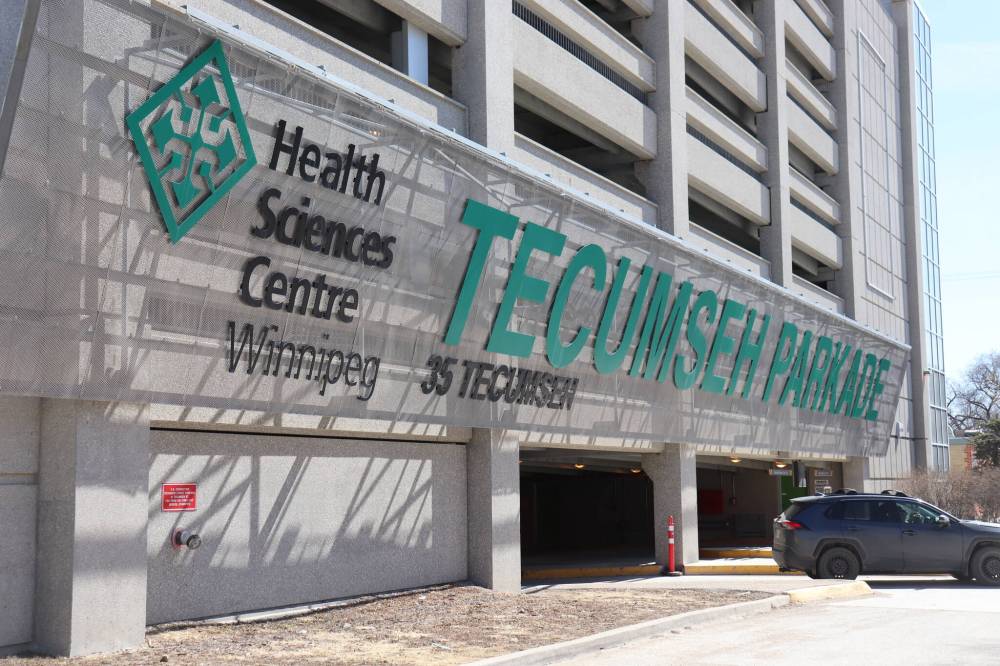Publicly funded physiotherapist assessments in Winnipeg have dropped more than 85 per cent since cost-cutting consolidated outpatient services to one hospital department, from eight, in 2017.
A report by the University of Manitoba found there were 18,261 physio assessments from January 2016 to shortly before the change in November 2017. There were only 6,715 assessments from December 2017 to December 2022.
The Winnipeg Regional Health Authority moved adult outpatient physiotherapy and occupational therapy out of public practice to the private sector in 2017, leaving only one clinic, in the Health Sciences Centre, public.

Tyler Searle / Free Press files
The Winnipeg Regional Health Authority moved adult outpatient physiotherapy and occupational therapy out of public practice to the private sector in 2017, leaving only one clinic, in the Health Sciences Centre, public.
At the time, it was labelled as an effort to save money; it was unclear how access to service would be affected. It was done a year after the Progressive Conservatives were elected on a campaign to reduce the provincial deficit, which was driven by burgeoning health-care costs.
In the seven years since the decision was made, far fewer people have received treatment, it has taken longer to discharge those who do get treatment, and the number of appointments per patient has decreased.
“Previous research has shown that if people don’t get proper rehabilitative care, but also timely rehabilitative care, it can affect their recovery from surgery or from injuries, and that can result in longer term disability for people,” said study co-lead Joanne Parsons, an associate professor at the U of M College of Rehabilitation Sciences.
Eligibility for publicly funded physiotherapy has become tougher since then, making the problem worse.
While some coverage has been reinstated, including hip and knee replacement physio through private clinics, gaps still remain, Parsons said.
“Previous research has shown that if people don’t get proper rehabilitative care, but also timely rehabilitative care, it can affect their recovery from surgery or from injuries, and that can result in longer term disability for people.”–Joanne Parsons
“We know things like chronic low-back pain, things like tendinitis, those things are very, very common, cause a lot of disability and decreased quality of life for people. Right now, those things aren’t covered at all,” she said.
Wait times for an assessment have decreased from 15 days to seven days, and Parsons said it’s a result of the “vast” number of people who no longer get physio.
Detailed rehab data is not available, meaning it’s unclear how many people who couldn’t get care paid for by taxpayers had gone to a private clinic, she said.
Parsons said Manitoba has a “two-tiered health care system” that has effectively disconnected lower-income people from the care they need.
An earlier study, conducted by Parsons and other researchers, surveyed the demographics of people who went to private clinics in Winnipeg. It found they were more likely to have higher incomes and more education, and less likely to be a visible minority or Indigenous.
“To me, it’s inequitable, for sure, but it also perpetuates those inequities,” she said. “Because if you can’t access that care, and perhaps it affects your function and your mobility, then you are maybe less able to work, maybe less able to work a better-paying job, and therefore, you get paid less, and then that cycle is just perpetuated.”
An initial assessment can cost as much as $120 per appointment, Parsons said.
Manitoba Physiotherapy Association president Derek Purvis said potential patients have stopped calling and are forced to live with preventable pain because they cannot pay for their own care.
“Out in the public, it’s not that we hear complaints from those people, it’s that they don’t call the clinics,” he said. “Because they’re private clinics, and if you don’t have third-party insurance or disposable income for those appointments, you just don’t hear from them.”
Provinces such as British Columbia and Alberta have income-based eligibility criteria for public outpatient physiotherapy, while Manitoba only offers condition-based eligibility.
Purvis said adopting an income-based program could be a way for the NDP government to boost care to people from all socioeconomic demographics.
“I think it’s timely because we have a government that’s looking for ways to support Manitobans,” he said, “This is a way to support Manitobans.”
Another option could be to increase the flexibility of funding that’s currently available for public chiropractor treatment, which could allow people to choose between seeing a chiropractor and a physiotherapist, or other rehabilitative care.
“It would be a fairly easy way to increase publicly funded care without recreating and bringing back all the outpatient clinics that used to exist in all these hospitals. All those clinics were closed, and that space has been taken up and used for other things. So, there would have to be a major investment to reopen those clinics,” Parsons said.
“However, I would certainly strongly support that, if they decided to do that.”
The study is set to be published in Physiotherapy Canada.
malak.abas@freepress.mb.ca

Malak Abas
Reporter
Malak Abas is a city reporter at the Free Press. Born and raised in Winnipeg’s North End, she led the campus paper at the University of Manitoba before joining the Free Press in 2020. Read more about Malak.
Every piece of reporting Malak produces is reviewed by an editing team before it is posted online or published in print — part of the Free Press‘s tradition, since 1872, of producing reliable independent journalism. Read more about Free Press’s history and mandate, and learn how our newsroom operates.
Our newsroom depends on a growing audience of readers to power our journalism. If you are not a paid reader, please consider becoming a subscriber.
Our newsroom depends on its audience of readers to power our journalism. Thank you for your support.